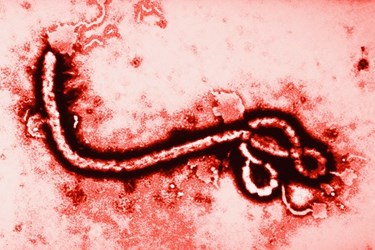NIH Works With FDA To Fast-Track Ebola Vaccine To Clinical Trials
By Cyndi Root

The National Institutes of Health (NIH) has announced that it plans to move an experimental Ebola vaccine into human clinical trials in the fall of 2014. In development for many years, the NIH says that the vaccine for the deadly virus was encouraging in the primate model. The agency is working with the Food and Drug Administration (FDA) to fast-track the clinical trial and it is working with pharmaceutical companies to find a commercial partner to scale up production if the studies show positive results. Anthony Fauci, director of the National Institute of Allergy and Infectious Diseases, told USA Today, that, "We are starting to discuss some deals with pharmaceutical companies to help scale it up, so on an emergency basis, it might be available in 2015 for health workers who are putting themselves at extreme risk.”
NIH Ebola Vaccine
The NIH has been working on an Ebola vaccine for several years. It announced its first results in 2010 on an experimental vaccine that protected monkeys against two Ebola virus species that were recognized in 1976 and against a newer species identified in 2007. In January 2013, the NIH announced that a research effort with Oregon Health & Science University (OHSU) found that an experimental vaccine composed of an attenuated vesicular stomatitis virus carrying a gene that codes for an Ebola virus protein induced antibodies that protected primates. Recently, the NIH gave Thomas Geisbert, a professor at the University of Texas Medical Branch, a $26 million grant to study a man-made antibody treatment, a drug from Tekmira Pharmaceuticals, and a vaccine to prevent and treat Ebola.
Industry Efforts
Scott Lillibridge, medical director of the U.S. Office of Foreign Disaster Assistance during the first Ebola outbreaks, said that the pharmaceutical industry has been reluctant to find treatments and vaccines because of the small demand and expectations that the the virus would cause only a few cases each year. Due to the current outbreak, pharmaceutical companies may be rethinking their strategy.
In July, Tekmira provided an update on the FDA’s clinical hold for its TKM-Ebola Phase I clinical program, saying that it hopes to resume studies by the end of 2014.
Ebola
Ebola is a virus with a fatality rate of up to 90 percent. The virus from West Africa spreads from an animal host to a human and spreads through person-to-person contact. It has infected over 1,300 people including health workers. There are no treatments or vaccines for the disease, which causes fever and headache and later, hemorrhaging, liver failure, and kidney failure.
